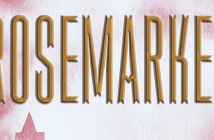Chronic illness affects an alarmingly large and startlingly young demographic. According to the U.S. Department of Health & Human Services, 31% of teens have a chronic illness. That means there are over 12 million of us, and we deserve stories with protagonists who look and feel like we do, who have plots that don’t revolve around their medical conditions.
I should draw a distinction between chronic illness and disability. Chronic illnesses can certainly be disabilities, but sometimes they bring a body to a precarious halfway point. It’s an awkward, frustrating place to live: still able-bodied enough to pass, but not healthy enough to go through your day without pain. That’s where I stand. Often, the symptoms’ severity will ebb and flow, forming an unpredictable roller coaster of good days miserable ones.
As a little girl, there were never any books about kids like me, kids who hurt all the time. The only people allowed to be in constant pain were either elderly or gravely injured. With a child’s oversimplified logic, I reasoned that either (1) chronic pain was a natural part of life and I was the only one complaining, or (2) the only pain worth noticing was the kind you accrued in battle, or a car accident, or terminal cancer. My pain wasn’t so bad compared to any of those options, so I obviously needed to sit down and shut up. I carried these assumptions with me well into adolescence.
Sometimes I think about how much sooner my outlook might have changed if I’d found even a single YA book with a chronically ill protagonist, one who lived a full life not despite but alongside her illness. I’ve been a voracious reader of YA for most of my life, so when I received my diagnosis, I ran a search for books about a character with my joint condition.
Instead of literary companionship, Google offered me medical textbooks and an ad for knee braces.
Thanks to the recent push for diversity in literature, I’ve seen more and more books featuring chronic illness and disability. However, we’re usually side characters at best, unless chronic illness is a major component of the plot. Then we’re shoved to center stage, often with stunning ignorance and inaccuracy.
 The most salient example on my radar is Everything, Everything. It’s a wonderfully diverse novel at first glance: the author is black, and the protagonist is a biracial, disabled young woman! What’s not to like?
The most salient example on my radar is Everything, Everything. It’s a wonderfully diverse novel at first glance: the author is black, and the protagonist is a biracial, disabled young woman! What’s not to like?
For starters – spoiler – the protagonist isn’t actually disabled. Her chronic illness was a figment of her mother’s imagination. Turns out she’s totally healthy, which lets her go out into the world with her love interest. Yay, a heartwarming ending for able-bodied readers everywhere. But chronically ill readers? We’re left wondering: why did she have to be stripped of her medical condition in order to live her life?
The troubling trend in YA (and books everywhere) is that if you’re truly disabled, you don’t get an upbeat ending. You can only find happiness if you also find yourself in an abled body. For many real-world chronically ill people, that’s not going to happen.
Fortunately, accurate representation can be found when you dig a little deeper. I ran another Google search for books about more common chronic illnesses, and found better results. Two Girls Staring at the Ceiling was hailed as a poignant and accurate story of a character with Crohn’s Disease, but in a way, it fits into the trend as well. Books well-reviewed by chronically ill readers (i.e. books with accurate representation) seem to focus heavily on the characters’ illnesses, wrapping the plot primarily around their trials and limitations. In other words, when we keep our disabilities, we lose our happy endings.
Many of us do have struggles, and sometimes it’s validating to see that reflected. That said, I also want books where a disabled protagonist has a story that doesn’t revolve around her medical condition. I want disabled geniuses and athletes and love interests. I want chronically ill musicians and heroes and mages, ones whose powers don’t completely cover for their illness. I want characters who grapple with the inherent messiness of their disabilities, but who are also defined by something (preferably many somethings) more than what they can’t do.
We, chronically ill teens, deserve to read about ourselves from a humanizing perspective: one that shows us not as trope-based cardboard cutouts, but as three-dimensional characters with real personalities, real struggles, and well-researched health conditions. I don’t expect there to be a book for every chronic illness on the planet. Like any other marginalized group, we’re not a monolith. There’s a huge amount of variance even under the umbrella of a single chronic illness. I’m an #ownvoices writer and I can barely get conclusive information on my own prognosis! But that doesn’t make good research impossible, and it certainly doesn’t let a novel off the hook for damaging misrepresentation.
If you’re an author writing about a chronically ill protagonist, research is crucial. (And no, Wikipedia doesn’t cut it.) Seek out the blogs and stories of real people living with the medical condition you’re about to throw on your character. Employ a sensitivity reader to check your manuscript for inaccuracies. There are 12 million young adults searching high and low for a relief from a daily deluge of ableism. There are 12 million young adults counting on you to do it right.
If you’re a reader who wants to support accurate representation, great! When you pick up a book with a chronically ill and/or disabled protagonist, examine it closely. Does the author perform a magical disappearing act on the character’s chronic illness, or does the protagonist live with their condition for the entirety of the novel? Is the character in question portrayed as a multifaceted human being? Better still, is the author #ownvoices (i.e. does the author have the same chronic illness as her character)? By reading and purchasing books that respect their chronically ill characters, you support the authors that write those books. You demonstrate to publishers that real stories of chronic illness matter. You show the world what we already know: that people will read these stories, that they change lives, and that they should be written.
After all, our bodies will never disappear, and neither will we. We deserve books that reflect in their characters our roadblocks and triumphs, our confusion and our brilliance, our struggles and our glory. There is ample space for these stories on the world’s bookshelves, and there are at least 12 million teens who cannot wait to find them there.
Are you a teen who wants to contribute to the Teen Talk column? Email our editor Nicole for more details.




